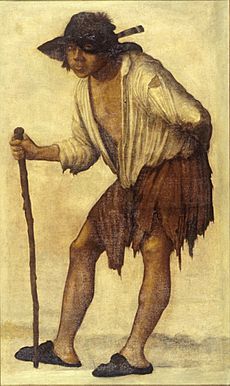Sturdy beggar facts for kids
In old English laws, a sturdy beggar was a person who was healthy and able to work, but chose to beg for money or wander around instead. These laws were made to control people who did not have a steady job or home. Early laws, like the Statute of Cambridge 1388, started to tell the difference between sturdy beggars and poor people who were truly sick, elderly, or had a disability.
Later, the Vagabonds and Beggars Act 1494 set out rules and punishments for sturdy beggars.
Contents
Why Laws Were Made
During the 1530s and 1540s, many monasteries in England were closed. Monasteries used to help poor people, so when they closed, there was less help available. This meant more people might have had to beg.
The Vagabonds Act of 1531 gave local officials, called justices of the peace, the power to give special permits to people who truly could not work. If you were able to work but begged without a permit, it became a crime.
Different Kinds of Sturdy Beggars
People who were called sturdy beggars sometimes used tricks to get money. Here are a few examples:
- Tom o'Bedlam: These people would pretend to be mentally ill. They might follow people around until they were given money to leave.
- Bristler: A bristler was someone who cheated at dice games. They used special dice that they could control to land on certain numbers.
- Counterfeit Crank: This person would pretend to have serious fits or seizures. They might use soap to make foam around their mouth to look sicker than they were.
Punishments for Begging
In the 1500s in England, there was no real difference made between people who wandered around without a home (vagrants) and those who were simply jobless. Both groups were often called "sturdy beggars." They faced harsh punishments and were often forced to move from one place to another.
In 1547, a new law was passed. For a first offense, vagrants could be forced to work for two years and branded with a "V" (for vagrant). Repeat offenses could lead to even more severe penalties.
See also
- Demanding money
External resources
- Poor Law Origins
 | Valerie Thomas |
 | Frederick McKinley Jones |
 | George Edward Alcorn Jr. |
 | Thomas Mensah |


